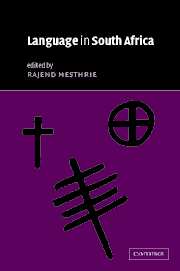Book contents
- Frontmatter
- Contents
- List of maps
- List of contributors
- Acknowledgements
- List of phonetic symbols
- List of abbreviations
- Introduction
- Part I The main language groupings
- Part II Language contact
- 9 Fanakalo: a pidgin in South Africa
- 10 Mutual lexical borrowings among some languages of southern Africa: Xhosa, Afrikaans and English
- 11 Code-switching, mixing and convergence in Cape Town
- 12 Code-switching in South African townships
- 13 Intercultural miscommunication in South Africa
- 14 Women's language of respect: isihlonipho sabafazi
- 15 The sociohistory of clicks in Southern Bantu
- 16 The political economy of language shift: language and gendered ethnicity in a Thonga community
- 17 From second language to first language: Indian South African English
- 18 Black South African English
- 19 The lexicon and sociolinguistic codes of the working-class Afrikaans-speaking Cape Peninsula coloured community
- 20 An Introduction to Flaaitaal (or Tsotsitaal)
- 21 Language and language practices in Soweto
- Part III Language planning, policy and education
- Index
- References
16 - The political economy of language shift: language and gendered ethnicity in a Thonga community
from Part II - Language contact
Published online by Cambridge University Press: 22 September 2009
- Frontmatter
- Contents
- List of maps
- List of contributors
- Acknowledgements
- List of phonetic symbols
- List of abbreviations
- Introduction
- Part I The main language groupings
- Part II Language contact
- 9 Fanakalo: a pidgin in South Africa
- 10 Mutual lexical borrowings among some languages of southern Africa: Xhosa, Afrikaans and English
- 11 Code-switching, mixing and convergence in Cape Town
- 12 Code-switching in South African townships
- 13 Intercultural miscommunication in South Africa
- 14 Women's language of respect: isihlonipho sabafazi
- 15 The sociohistory of clicks in Southern Bantu
- 16 The political economy of language shift: language and gendered ethnicity in a Thonga community
- 17 From second language to first language: Indian South African English
- 18 Black South African English
- 19 The lexicon and sociolinguistic codes of the working-class Afrikaans-speaking Cape Peninsula coloured community
- 20 An Introduction to Flaaitaal (or Tsotsitaal)
- 21 Language and language practices in Soweto
- Part III Language planning, policy and education
- Index
- References
Summary
INTRODUCTION
The linguistic group classed as Tsonga (Guthrie's S.50) is generally taken to include at least three distinct subgroups, geographically distributed in South Africa and Mozambique. There are, however, certain questions arising here. On the one hand, there are the usual issues about linguistic heterogeneity within the group and about the degree in which common identity has developed out of the promulgation of a standard language in educational and other formal contexts instead of common identity providing the impetus for a shared standard language. The latter issue can be raised for all of the African language groups in South Africa, but it is particularly vexing for the Tsonga.
Social scientists often assume that deep-structure similarities and a sense of shared identity provide the basis for assigning groups to particular categories. In part, this tendency follows from a nineteenth-century equation of language and nation, which was further developed into an unquestioned language = culture = nation paradigm that served as the basis for most descriptive work in southern Africa and, sadly, for the failed homeland policy of the former government. However, even early analysts noted that the only basis for classifying the Tsonga-speaking peoples was shared linguistic features and that there was neither a sense of common identity among the people nor a commonality of custom (Junod 1896, 1905): ‘tous ces clans formant le peuple thonga n'ont en commun que quelques coutumes tendant à disparaître. La seule chose qu'ils possèdent en propre, c'est un langage bien caractéristique, antique, riche.
- Type
- Chapter
- Information
- Language in South Africa , pp. 316 - 336Publisher: Cambridge University PressPrint publication year: 2002
References
- 4
- Cited by



